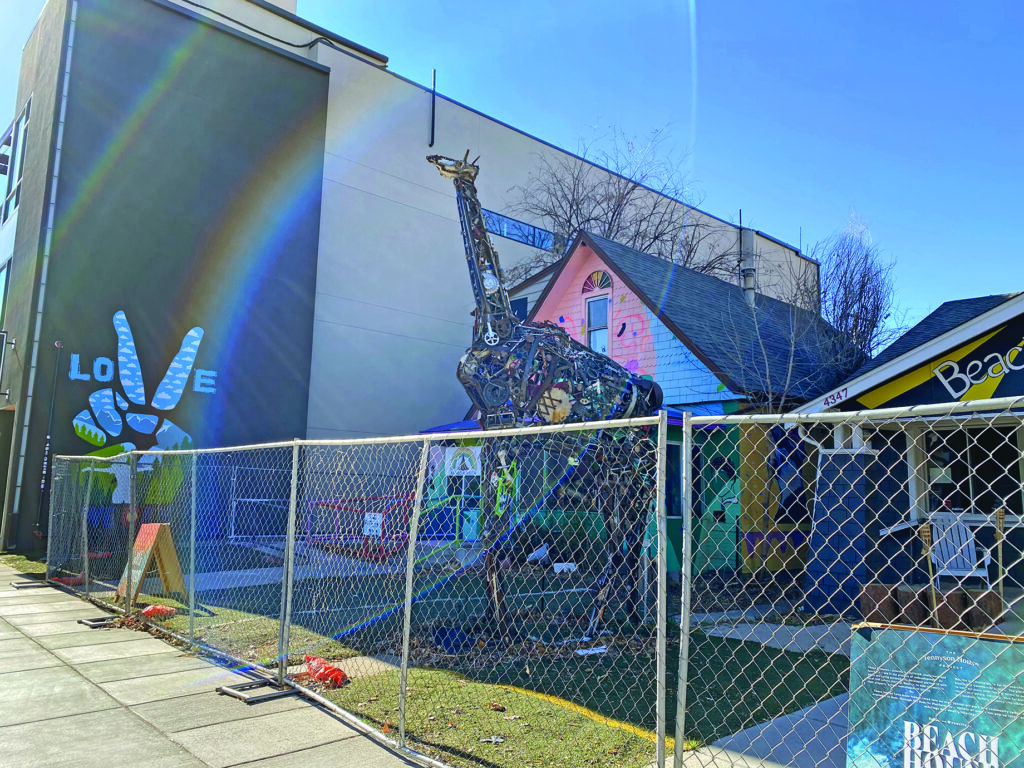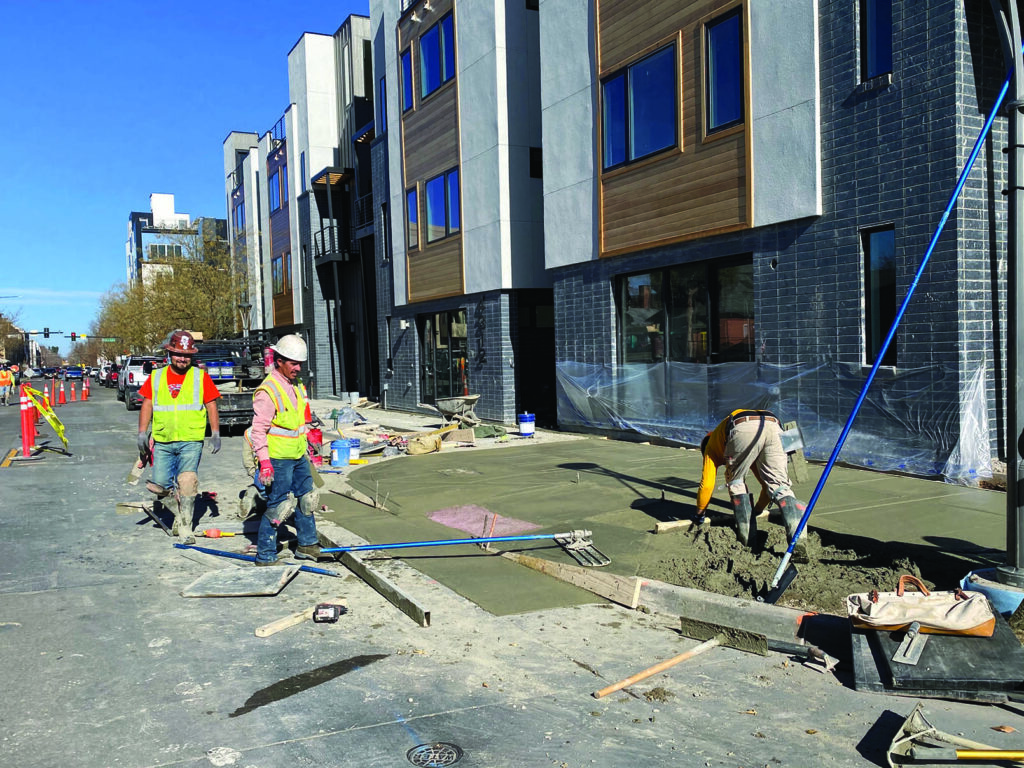
Photos by Vicky Collins
The Christmas tree lot opened on November 20 in the Old Elitch’s dome just south of 38th Avenue and Tennyson. Further up the street on 44th Avenue, green garlands with festive red bows popped up around the patio at Parisi restaurant. Owner Christine Parisi vowed she would make the holidays festive. “I need soft reminders that everything is feeling okay. I’m a sucker for the holidays. The day after Thanksgiving we run Christmas music until Christmas.”
Those with businesses on Tennyson in Berkeley have had to reckon with a year that, despite initial promise, has collapsed in on itself. While COVID-19 is the Grinch who stole all of 2020 (likely including Christmas), the transformation of Tennyson St. began long before the pandemic and will likely continue long after it ends.
Alyssa Manny is the Vice President of Explore Tennyson Berkeley Neighborhood Association. “Tennyson Street is vibrant because of the collective diversity in small business. We have amazing entrepreneurs that have found a quality niche in our little teeny tiny ecosystem on Tennyson Street…No one was prepared for the reality of shutting down an entire economy,” Manny said. “You’re requiring a full pivot in superhero speed,” said Manny.
This is not the first time change has come to Tennyson Street. In the early 20th century, streetcars ran along 38th and 44th Avenues, and riders hopped off at Tennyson for shopping and entertainment. Near the North end at 44th Avenue and Tennyson is The Oriental Theater which opened on Christmas Eve 1927 and was the neighborhood movie palace before it became a theater with live music and comedy shows. At the South end at 38th Avenue and Tennyson is what remains of the old Elitch Gardens which got its start on May Day 1890.
Mary Elitch, the owner of Elitch Gardens, had a particular interest in developing the arts and cultural scene in Berkeley. In his book “North Side Story,” Phil Goodstein talks about Tennyson Street’s artistic origins. Elitch Gardens was part botanical gardens, part zoo, part theater, part amusement park. Mary even rode around the grounds in a cart pulled by an ostrich. In 1917 she opened what would become the Trocadero Theater, which became Denver’s top summer dancing spot. The playhouse could house 1500 and had summer stock with Broadway actors. The advertising slogan was “Not to see Elitch’s is not to see Denver.”
The last ten to twenty years could be seen as a renaissance period for the area, as new but reasonably priced bars and art galleries populated the street, First Friday art walks brought out people from across North Denver and across the region, and the street hosted numerous community events such as the ever popular Totally Tennyson, an 80s themed party that raises money for schools. In the last few years however, those art galleries shuttered one after another, replaced by more yoga studios, high end bars, apartments with no ground level retail, and an increasing number of businesses that aren’t focused on walk-in traffic.

Today, Tennyson is still rapidly gentrifying or is possibly the first post-gentrification district, depending on who you ask. In a nod to the transformation, high-end athletic wear purveyor Lululemon recently opened a seasonal popup on the street, Corepower Yoga has found a home, and a high end boutique hotel is coming in January. All have raised some eyebrows, as have apartment buildings without ground floor retail. Some residents feel the trendiness is not in character with the street’s mom and pop gestalt.
Jill Carstens has lived in the neighborhood for 23 years. “The soul of the neighborhood has definitely changed.” Her family used to enjoy Elitch Lanes and her son had his hair cut at David’s Barbershop. She remembers when there was a hardware store in place of Allegro Roasters and little art galleries and shops in the old Victorians. Carstens misses the anchor businesses that used to be on Tennyson like Elitch Lanes, Flesher Hinton music company, and Green Door Furniture. Walking on the street, one can still see the signage of the latter two.
Tennyson Street hosted Denver’s oldest art walk and Jill would like more artists featured on First Friday. “They call it the culture walk now but it’s really a bar crawl,” says Carsten.
This past summer Jill organized First Friday art walks in Berkeley Regis and is hoping to bring neighborhood artists into some of the new developments popping up on Tennyson. At the moment there are only a handful of galleries left. Art returned with a big splash to Tennyson Street this past summer when three vacant houses between 42nd and 43rd Streets got a new lease on life with temporary shops, galleries, and immersive events. But now fencing has gone up around the old homes and they are waiting to be demolished next spring.
“When everything is homogenous it looks the same and everything is bright and shiny and new but it loses its character. You lose the uniqueness of the area,” says Carstens. She’s frustrated that a design overlay requiring more ground level stores instead of housing that began several years ago under a previous council member hasn’t been implemented yet (for more information on that proposal, stay tuned for the January issue of The Denver North Star). She refers to part of the street as Tennyson Canyon because of the three story apartments and worries the area will be suburbanized. “If we don’t do something, only millionaires are going to live here. I don’t want our friends to be kicked out or not want to live here because it’s changed so much.”
Alyssa Manny worries too. “I think that what you’re going to see is a continuation of high lease rates as all the small businesses shutter. The only businesses that can survive this significant fixed cost is a brand that has a national feel to it. I would expect to see things like State Farm insurance company and Chipotle. They’re going to be the only ones that can endure financial risk in the future.” Alyssa stops short of calling this a shame, but worries about national brands’ interest in the neighborhood. “It’s our small businesses on our streets that are constantly giving back to our communities. We’re the ones sponsoring baseball teams and giving back to the homeless. We want to see this whole area continue to thrive.”
Today, Alyssa Manny is pragmatic about her business, Ohana Yoga + Barre. “I don’t have any lofty illusions of profit in the next two years. We will be adversely affected by this two years from now, five years from now, ten years from now. It’s survival mode.”
She has advice for people watching Tennyson Street change. She says communities need to consider what they want the landscape to look like coming out of the pandemic. “Right now the fear is driving a limited myopic view and people need to start considering the big picture. What do you want your quality of life to be like, and put your dollars there. Support that.”

Vicky – I LOVED your column – thank you! I grew up in Aurora and in 1983 ‘escaped’ to the west side in 1983. I lived off of 35th and Stuart. I wish I could remember the dive bar that is now New York Pizza Pub and shops.
I need to pay more attention to what the neighborhood holds – it’s changing so fast.
Thanks again!